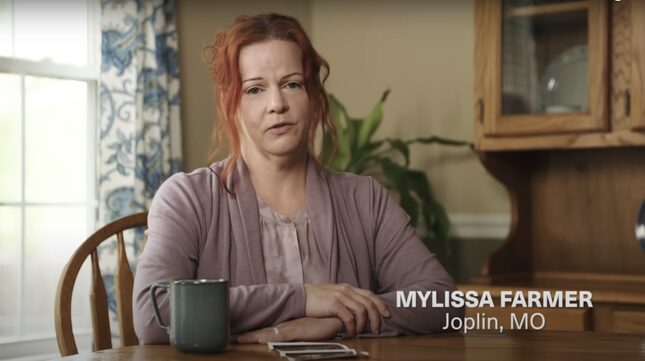A Kansas Hospital Refused Her an Emergency Abortion Due to ‘Heated Political Environment.’ Now, She’s Suing.
Mylissa Farmer’s landmark sex discrimination lawsuit is also one of the first EMTALA lawsuits filed since the Dobbs decision.
Photo: Screenshot AbortionPolitics
On Tuesday, a Missouri woman filed a federal lawsuit against the University of Kansas Health System for denying her an emergency abortion in 2022. In the suit, she alleges the hospital system violated a federal law requiring doctors to provide emergency, stabilizing care including abortion (the Emergency Medical Treatment and Labor Act, or EMTALA), as well as Kansas’ nondiscrimination law. KU denies all the allegations.
In August 2022, Missouri resident Mylissa Farmer went to the local emergency room when her water broke at 17 weeks. Her pregnancy had already been high-risk, and doctors warned her that she faced an increased risk of sepsis, loss of her uterus, and even death. Despite determining that Farmer was having a miscarriage, the hospital declined to perform an abortion, and Farmer and her husband drove three hours to the University of Kansas Health System’s Main Campus. According to Farmer’s lawsuit, the KU hospital also declined to provide an emergency abortion, and the obstetrician on duty said it would “be too risky in the heated political environment.” To be clear, at the time, abortion was (and is!) legal in Kansas up to about 22 weeks. Incidentally, the same night the Kansas hospital turned Farmer away, Kansans overwhelmingly voted against a ballot measure that would have removed the right to abortion from the state Constitution.
After being discharged, Farmer drove to Illinois, already several days into her miscarriage. An Illinois clinic provided her with the emergency abortion she needed, but Farmer’s suit alleges that she suffered an infection as a result of the needless delay in care, which subjected her to a longer recovery time. In October 2022, Farmer first shared her story ahead of the midterm elections and recounted her experience in an ad for then-Senate Democratic candidate Trudy Busch Valentine. In the ad, Farmer emphasized the stakes of the election for abortion rights if Republican Eric Schmitt won the seat. Farmer and the National Women’s Law Center, which is representing her, were moved to file this lawsuit after the Supreme Court’s recent decision in Moyle v. U.S., which said that under EMTALA, Idaho doctors can provide emergency abortion care… at least for now. The court ultimately ruled that the case was “improvidently granted,” sending it back to a lower court.
Farmer’s suit is one of the first filed under EMTALA by an individual denied emergency abortion care since the Supreme Court overturned Roe. Michelle Banker, senior director of litigation for reproductive rights and health at the NWLC, argues that the Supreme Court’s ruling “only reinforces the merits of” Farmer’s case.
-

-

-

-

-

-

-

-

-

-

-

-

-

-

-

-

-

-

-

-

-

-

-

-

-

-

-

-

-

-

-

-

-

-

-

-

-

-

-

-








































